
Viking Names
Riby
Riby, in the Yarborough Wapentake of Lincolnshire, was originally an Old English compound Rygetun ‘the farmstead or village where rye grows’. The Old English tun ‘farm, settlement’ was replaced by Old Norse by ‘farm, settlement’.
Read More
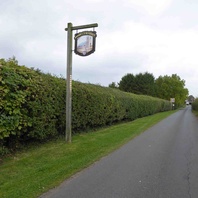
Viking Names
Fenby
Fenby, in the Haverstoe Wapentake of Lincolnshire, is an Anglo-Scandinavian hybrid from Old English fenn ‘a fen, a marsh, marshland’ and Old Norse by ‘a farmstead, a village’. It is most likely to be a partial Scandinavianization of an earlier Old English place-name, perhaps Fenton, with a similar meaning. Fenby is now a joint parish with Ashby, and the name survives in Fenby Farm, which lies in what must have been a fenny area on the lower slope of the Wolds.
Read More

Viking Names
Kirton
Kirton, in the Bassetlaw Wapentake of Nottinghamshire, is a hybrid name, a compound of Old Norse kirkja ‘a church’ and Old English tun ‘ an enclosure; a farmstead; a village; an estate’.
Read More
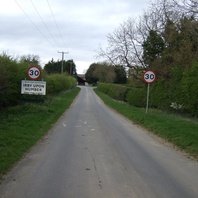
Viking Names
Irby upon Humber
Irby upon Humber, in the Bradley Wapentake of Lincolnshire, comes from Old Norse Íra,the genitive plural form of Íri ‘an Irishman; probably also a Norseman who had lived in Ireland’ and Old Norse by ‘a farmstead, a village’. The reference is probably to an isolated settlement of Norwegian vikings from Ireland, or perhaps Irishmen who came with the vikings to England. However, the exact implications of such a name are not yet fully understood and are the subject of ongoing work by Dr Jayne Carroll of the Institute for Name-Studies, University of Nottingham. Irby upon Humber is to distinguish the place from Irby in the Marsh, also in Lincolnshire.
Read More
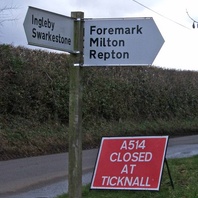
Viking Names
Repton
Repton, in the Repton and Gresley Hundred of Derbyshire, comes from Old English Hrype, an Anglian tribe, and Old English dun ‘a hill’. According to the Anglo-Saxon Chronicle, The Great Heathen Army wintered in Repton in 873-4.
Read More
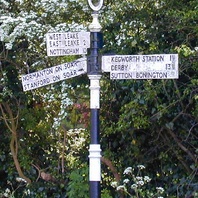
Viking Names
West Leake
West Leake, in Rushcliffe Wapentake of Nottinghamshire, is a simplex name from Old Norse lœkr ‘brook’. East and West Leake are on the banks of a small stream which joins the Soar at Kingston.
Read More

Viking Names
Miningsby
Miningsby, in the Bolingbroke Wapentake of Lincolnshire, is a very difficult name with a great variety of spellings. The best suggestion for the first element is the Old Norse male personal name Miðjungr, but this name is only known as that of a mythical giant, recorded in an early skaldic poem cited in Snorri Sturluson’s Edda, or as an appellative for ‘giant’ in skaldic poetry more generally. The second element is Old Norse by ‘a farmstead, a village’.
Read More
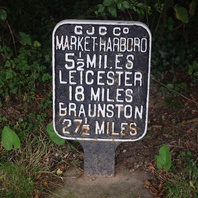
Viking Names
Leicester
Leicester is one of the Five Boroughs of the Danelaw. The first element of the place-name probably comes from a tribal name derived from the pre-English river-name Legra which would have been given in Old English as Legor or Ligor. This river-name is likely identical or related to the River Loire in France. The second element of the name is Old English ceaster ‘a city; an old fortification; a Roman site’. Thus the place-name gives the sense of ‘the fortified Roman town of the folk called Legore (or Ligore)’.
Read More
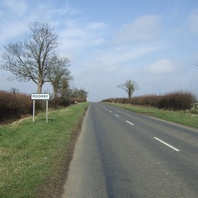
Viking Names
Moorby
The first element of Moorby, in the Horncastle Wapentake of Lincolnshire, is either Old English mor or Old Norse mór ‘a marsh; barren upland’ here in the sense ‘moor’. The second element is Old Norse bý ‘a farmstead, a village’. The village is on the slope of the Wolds.
Read More

Viking Names
Wigtoft
Wigtoft, in the Kirton (in Holland) Wapentake of Lincolnshire, is likely an Anglo-Scandinavian compound. The first element is uncertain, but it is probably Old Norse vík ‘a small creek, an inlet, a bay’. The second element is Old English toft ‘a curtilage, the plot of ground in which a dwelling stands’. Wigtoft is situated near Bicker Haven, which was formerly an arm of the sea.
Read More

Viking Names
Fotherby
Fotherby, in the Ludborough Wapentake of Lincolnshire, comes from the Old Norse male personal name Fótr and the Old Norse element bý ‘a farmstead, village’. The same personal name occurs in other place-names in Lincolnshire including Foston and Fosdyke. There is also a Foston in Derbyshire.
